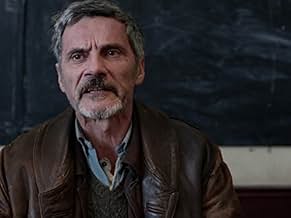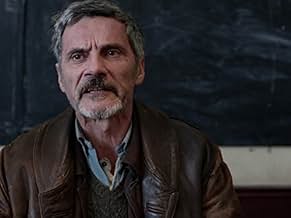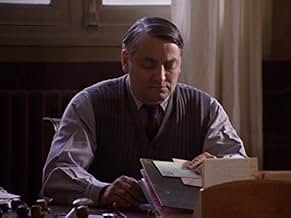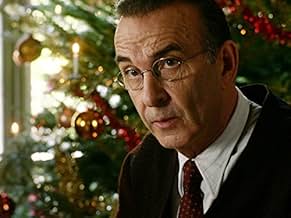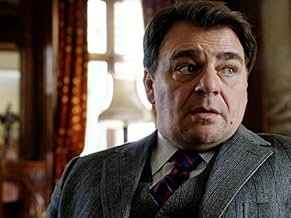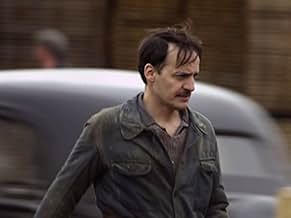Un village français et ses habitants traversent les hauts et les bas de l'occupation de l'armée allemande de 1940 à 1945. Le médecin du village est nommé maire et confronté aux défis, dilemm... Tout lireUn village français et ses habitants traversent les hauts et les bas de l'occupation de l'armée allemande de 1940 à 1945. Le médecin du village est nommé maire et confronté aux défis, dilemmes et demandes et situations contradictoires.Un village français et ses habitants traversent les hauts et les bas de l'occupation de l'armée allemande de 1940 à 1945. Le médecin du village est nommé maire et confronté aux défis, dilemmes et demandes et situations contradictoires.
- Prix
- 2 victoires et 10 nominations au total
Parcourir les épisodes
Avis en vedette
I wasn't sure about watching this series but I was really hooked by Episode 3 of the first season. However, a couple of my favorite French stars, Thierry Godard and Audrey Fleurot, drew me to the series. It was well worth it. I just completed the last season and have since purchased the entire series. I have never done that before.
The story behind the citizens of the town is intriguing all through their lives and to the final episodes as I watched them decline in health and appearance. It is a fascinating story of the Occupation and how the war affected these citizens of an obscure French village. Viewers were introduced to the harsh reality of war in France if you watched "Band of Brothers" but this shows the sorrow, death and troubling decisions citizens had to make as the war and occupation moved on.
I recommend this to all viewers. Yes, it takes a lot of time to watch it but it is worth it.
The story behind the citizens of the town is intriguing all through their lives and to the final episodes as I watched them decline in health and appearance. It is a fascinating story of the Occupation and how the war affected these citizens of an obscure French village. Viewers were introduced to the harsh reality of war in France if you watched "Band of Brothers" but this shows the sorrow, death and troubling decisions citizens had to make as the war and occupation moved on.
I recommend this to all viewers. Yes, it takes a lot of time to watch it but it is worth it.
This is a truly remarkable, riveting, and even addictive TV series, certainly one of the best I have ever seen, regardless of language. (I'm 64. I've seen a lot of TV series.) What makes it remarkable? The acting is uniformly first-rate, the direction very good, the script even better than first-rate. Each episode holds you from the get-go, and many end with cliff-hangers that make you want to start the next episode. As I said, it is downright addicting.
Are there any flaws? I don't know that I would call them flaws, but I can see that those interested in the history of the Occupation in France could have several issues with the series.
1) A previous reviewer wrote that it is an "Excellent TV show explaining the life of ordinary people in Nazi occupied France." Not really true. The main French characters are almost all members of the haute bourgeoisie: a leading doctor, a factory manager, the chief of police, etc. They do not deal with the issues that friends of mine remember from the Occupation: the shortage of everything, starting with food and fuel to heat homes. For ordinary French people, the Occupation was four years of waiting in line every day for bare necessities, punctuated by an occasional dramatic event. That wouldn't make for good TV drama, though, so this series has made the dramatic more "common" than it evidently was in the life of the average French person. The episodes almost all focus on dramatic events. It makes for riveting viewing, certainly, but it gives a skewed view of daily life during the Occupation.
2) Much of the focus is on sex and marital infidelity, rather than issues specific to the Occupation. (It reminds me a lot of Zola's Germninal in that sense.) This holds audiences, certainly, but there is nothing particularly related to the Occupation here. Almost all the wives turn out to be unfaithful to their husbands. I'm not sure how a feminist would react to that, or indeed many French women, faithful to their husbands or boyfriends, who lived through the era.
3) The depiction of the Communist Party leaders is uniformly negative. Again, the focus seems to be very bourgeois, very much Gaulliste. I noticed, for example, that when others, even Gaullistes like Bériot, refer to the Communists as Bolsheviks, that just gets translated as Communist. There is, of course, a big difference there. It is very true that many non-Communists feared the Communist Resistance and feared that their goal was to lead France into another class war/revolution, but that was not in fact the goal of all the FTP/Communist resistants.
All that said, I repeat that this is a riveting series. You will not regret watching it - except that you may well become addicted to it.
-----------------
I have now watched through the end of Season 6, which is as far as the American distribution has gone as of January 2017. (Season 7 is announced for mid-February.) All I have to add to what I wrote above is that this series does a remarkable job of making all the lead characters, no matter what their political position, very human and very three-dimensional. No one is all bad, and virtually no one is all good. That becomes very problematic for me in the case of the Militiamen and some of the Germans, the SS and the Gestapo. I don't like feeling sympathy or compassion for individuals who have committed monstrous crimes, as some of these characters do. Nevertheless, I will concede that even someone who can shoot two little children in cold blood - that is a VERY difficult scene to watch - might also have human qualities. I don't like conceding that, but I will.
The end of episode 12 of Season 6 turned my blood cold. It focused on some of the worst events of the Liberation, and made it anything but a joyous event. I know, having interviewed people who lived in a small town in France at that time, that what is described did indeed take place across France. Some of it is even toned down, like the shearing of the women accused of collaboration with the Germans. Still, it is a particularly somber note on which to end the penultimate season.
Are there any flaws? I don't know that I would call them flaws, but I can see that those interested in the history of the Occupation in France could have several issues with the series.
1) A previous reviewer wrote that it is an "Excellent TV show explaining the life of ordinary people in Nazi occupied France." Not really true. The main French characters are almost all members of the haute bourgeoisie: a leading doctor, a factory manager, the chief of police, etc. They do not deal with the issues that friends of mine remember from the Occupation: the shortage of everything, starting with food and fuel to heat homes. For ordinary French people, the Occupation was four years of waiting in line every day for bare necessities, punctuated by an occasional dramatic event. That wouldn't make for good TV drama, though, so this series has made the dramatic more "common" than it evidently was in the life of the average French person. The episodes almost all focus on dramatic events. It makes for riveting viewing, certainly, but it gives a skewed view of daily life during the Occupation.
2) Much of the focus is on sex and marital infidelity, rather than issues specific to the Occupation. (It reminds me a lot of Zola's Germninal in that sense.) This holds audiences, certainly, but there is nothing particularly related to the Occupation here. Almost all the wives turn out to be unfaithful to their husbands. I'm not sure how a feminist would react to that, or indeed many French women, faithful to their husbands or boyfriends, who lived through the era.
3) The depiction of the Communist Party leaders is uniformly negative. Again, the focus seems to be very bourgeois, very much Gaulliste. I noticed, for example, that when others, even Gaullistes like Bériot, refer to the Communists as Bolsheviks, that just gets translated as Communist. There is, of course, a big difference there. It is very true that many non-Communists feared the Communist Resistance and feared that their goal was to lead France into another class war/revolution, but that was not in fact the goal of all the FTP/Communist resistants.
All that said, I repeat that this is a riveting series. You will not regret watching it - except that you may well become addicted to it.
-----------------
I have now watched through the end of Season 6, which is as far as the American distribution has gone as of January 2017. (Season 7 is announced for mid-February.) All I have to add to what I wrote above is that this series does a remarkable job of making all the lead characters, no matter what their political position, very human and very three-dimensional. No one is all bad, and virtually no one is all good. That becomes very problematic for me in the case of the Militiamen and some of the Germans, the SS and the Gestapo. I don't like feeling sympathy or compassion for individuals who have committed monstrous crimes, as some of these characters do. Nevertheless, I will concede that even someone who can shoot two little children in cold blood - that is a VERY difficult scene to watch - might also have human qualities. I don't like conceding that, but I will.
The end of episode 12 of Season 6 turned my blood cold. It focused on some of the worst events of the Liberation, and made it anything but a joyous event. I know, having interviewed people who lived in a small town in France at that time, that what is described did indeed take place across France. Some of it is even toned down, like the shearing of the women accused of collaboration with the Germans. Still, it is a particularly somber note on which to end the penultimate season.
Having watched all 65 episodes (seven seasons), I'm overwhelmed by how the scriptwriters not only confronted French viewers with all the gray areas involving their parents or grandparents' collaboration with the Nazis during the time of the Vichy government but also created such complex characters that we sometimes find ourselves booing and hissing the alleged "good guys" and cheering some characters who have behaved in an abominable fashion. But then, the "good guys" can turn out to be more evil than we supposed, and some "bad guys" can readily accept responsibility for all their actions, no matter how monstrous. Some of the most corrupt characters are also the most pragmatic survivors.
Those who stick with the series until the end had better get their hankies ready for the final, completely heart-wrenching two episodes.
The actors are uniformly exceptional in this ensemble cast of hundreds. Most of all, I will never forget Nicolas Gob as Jean Marchetti, a French cop who obeys every command involving the rounding up of Jews or Communists for execution and deportation until he falls for a Jewish woman, Rita (Axel Maricq). But by then, he has acquired the nickname, "Butcher of Villeneuve."
Then there are Robin Renucci and Audrey Fleurot as Dr. Daniel and Hortense Larcher. Dr. Larcher finds himself unwillingly thrust into the position of town mayor whose scruples are compromised one by one until he finds himself compiling death lists with another official, Servier (Cyril Couton), to quench the Nazi thirst for blood in retaliation for Resistance violence done to them, an action that will later have dire repercussions for both men. As for Hortense Larcher, she finds herself attracted to a Nazi leader, Heinrich Muller (Richard Sammel) and is ready to forgive his every sadistic cruelty.
Then there's Lucienne (Marie Kremer), a schoolteacher who falls for a handsome German soldier, Kurt (Samuel Theis) but when he's about to be transferred to the Russian front and she finds herself pregnant, she agrees to marry the headmaster, Bériot (François Loriquet), who is willing to adopt her child as his own.
Finally, there are the major Resistance fighters: Larcher's brother, Marcel (Fabrizio Rongione) and his mistress, Suzanne (Constance Dollé); and Marie (Nade Dieu), a farmer's wife, who is involved with the married owner of a sawmill, Raymond Schwartz (Thierry Godard), who initially is apolitical and gladly sells his product to the Nazis, but ultimately joins the Resistance. Then there's the young Resistance fighter Antoine (Martin Loizillon), who shamefully is forced to leave four buddies behind to be slaughtered by Nazi troops. Finally, there is Schwartz's wife, Jeannine (Emmanuelle Bach) who is determined to survive and prosper, no matter who rules the country.
For me, this is the finest, most engrossing series I've seen since the Spanish "Gran Hotel."
Those who stick with the series until the end had better get their hankies ready for the final, completely heart-wrenching two episodes.
The actors are uniformly exceptional in this ensemble cast of hundreds. Most of all, I will never forget Nicolas Gob as Jean Marchetti, a French cop who obeys every command involving the rounding up of Jews or Communists for execution and deportation until he falls for a Jewish woman, Rita (Axel Maricq). But by then, he has acquired the nickname, "Butcher of Villeneuve."
Then there are Robin Renucci and Audrey Fleurot as Dr. Daniel and Hortense Larcher. Dr. Larcher finds himself unwillingly thrust into the position of town mayor whose scruples are compromised one by one until he finds himself compiling death lists with another official, Servier (Cyril Couton), to quench the Nazi thirst for blood in retaliation for Resistance violence done to them, an action that will later have dire repercussions for both men. As for Hortense Larcher, she finds herself attracted to a Nazi leader, Heinrich Muller (Richard Sammel) and is ready to forgive his every sadistic cruelty.
Then there's Lucienne (Marie Kremer), a schoolteacher who falls for a handsome German soldier, Kurt (Samuel Theis) but when he's about to be transferred to the Russian front and she finds herself pregnant, she agrees to marry the headmaster, Bériot (François Loriquet), who is willing to adopt her child as his own.
Finally, there are the major Resistance fighters: Larcher's brother, Marcel (Fabrizio Rongione) and his mistress, Suzanne (Constance Dollé); and Marie (Nade Dieu), a farmer's wife, who is involved with the married owner of a sawmill, Raymond Schwartz (Thierry Godard), who initially is apolitical and gladly sells his product to the Nazis, but ultimately joins the Resistance. Then there's the young Resistance fighter Antoine (Martin Loizillon), who shamefully is forced to leave four buddies behind to be slaughtered by Nazi troops. Finally, there is Schwartz's wife, Jeannine (Emmanuelle Bach) who is determined to survive and prosper, no matter who rules the country.
For me, this is the finest, most engrossing series I've seen since the Spanish "Gran Hotel."
"Un village français" is one of these rare TV series which suck you in through realistic plots mixing suspense, love, betrayal without being sensationalist, and staying simple (although the numerous love triangles are a little too much at times). French TV being filled with painfully mediocre, if not absolutely bad series, "Un village français" stands out as the best one out there, by far.
The realism of it is one of the factors which make it great. The actors are superb, their characters genuine, the women beautiful in a classy way (not tasteless bombshells), and the plots explore simple people's decisions during the hard circumstances of the Occupation, without ever openly judging their acts.
The series starts kind of slow. I'd say the first season is the weakest yet, even though it has the ultimate spectacular scenes when the German army takes control of the village. The series only gets better as the viewer is more familiar with each character, and follows their individual paths, their interactions, their fears and decisions. It takes its time. It doesn't rush into the events of the Occupation, and rather presents the slow evolution of French Collaboration as things get harsher and more fixed, and the characters ultimately need to find themselves and chose their definite side, or remain torn.
As said before, "Un village français" doesn't judge, staying remarkably neutral when possible, not opting for an easy manichean presentation of the Occupation. Many characters turned collaborators are not bad people and even try to do good, like the mayor of the village, or one young woman who has an affair with a German soldier. Even the young chief of police (Jean Marchetti) is likable. As I'm writing this, the series is only in its fourth season, so I can't wait to see how these characters will be treated in the last season which will presumably depict the Liberation. Hopefully, it will continue to show the harsh reality (I'm expecting head shavings, trials, public dishonor, executions, escapes and pardons... the characters are so diverse that each fates are possible).
A great TV series, which I highly recommend to those who have a chance to see it.
The realism of it is one of the factors which make it great. The actors are superb, their characters genuine, the women beautiful in a classy way (not tasteless bombshells), and the plots explore simple people's decisions during the hard circumstances of the Occupation, without ever openly judging their acts.
The series starts kind of slow. I'd say the first season is the weakest yet, even though it has the ultimate spectacular scenes when the German army takes control of the village. The series only gets better as the viewer is more familiar with each character, and follows their individual paths, their interactions, their fears and decisions. It takes its time. It doesn't rush into the events of the Occupation, and rather presents the slow evolution of French Collaboration as things get harsher and more fixed, and the characters ultimately need to find themselves and chose their definite side, or remain torn.
As said before, "Un village français" doesn't judge, staying remarkably neutral when possible, not opting for an easy manichean presentation of the Occupation. Many characters turned collaborators are not bad people and even try to do good, like the mayor of the village, or one young woman who has an affair with a German soldier. Even the young chief of police (Jean Marchetti) is likable. As I'm writing this, the series is only in its fourth season, so I can't wait to see how these characters will be treated in the last season which will presumably depict the Liberation. Hopefully, it will continue to show the harsh reality (I'm expecting head shavings, trials, public dishonor, executions, escapes and pardons... the characters are so diverse that each fates are possible).
A great TV series, which I highly recommend to those who have a chance to see it.
Fantastic series. It makes the war real, very concrete: not the battles, which we have seen before, but the struggles of ordinary people, trying to understand what's happening, and what that means for their convictions, their acts, who they are. They're slowly adjusting. We all ask ourselves what we would have done, but we forget about "time". Dealing with and understanding the occupation and atrocities took time. It's hard to understand now how people could be horrible, but it was hard then too. The war is hard, what happens to adults horrible. But, I have to say that the part about the Jewish children is unbearable, excruciating. This hits the limits of human understanding. As a mother, I couldn't go through it. Nobody could face this. We all know what happened, and can't accept it, but seeing this so real...
Le saviez-vous
- AnecdotesThe town depicted in the series, Villeneuve, is fictional.
- GaffesIn a first-season episode set during 1940, a German soldier is shown wearing the Close Combat Clasp, a decoration which first began to be awarded in November, 1942.
- ConnexionsReferenced in Séries express: Episode #2.30 (2009)
Meilleurs choix
Connectez-vous pour évaluer et surveiller les recommandations personnalisées
Détails
- Date de sortie
- Pays d’origine
- Site officiel
- Langue
- Aussi connu sous le nom de
- A French Village
- sociétés de production
- Consultez plus de crédits d'entreprise sur IMDbPro
- Durée52 minutes
- Couleur
- Rapport de forme
- 1.78 : 1
Contribuer à cette page
Suggérer une modification ou ajouter du contenu manquant

Lacune principale
What is the Brazilian Portuguese language plot outline for Un village français (2009)?
Répondre
![Regarder Bande-annonce Saison 1 [OV]](https://m.media-amazon.com/images/M/MV5BYjJkN2E2M2QtNjgyZS00NTVjLThlYzMtNjBlM2QxZTMxODMwXkEyXkFqcGdeQXRodW1ibmFpbC1pbml0aWFsaXplcg@@._V1_QL75_UX500_CR0)
